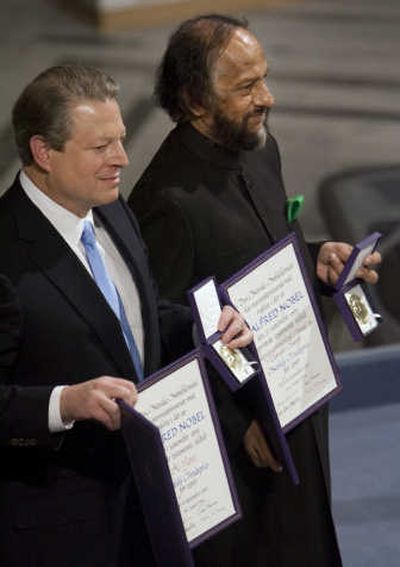End war against planet, Gore says

OSLO, Norway – Saying it’s “time to make peace with the planet,” Al Gore accepted the Nobel Peace Prize on Monday with a call for humanity to rise up against a looming climate crisis and stop waging war on the environment.
The United States and China – the world’s leading emitters of greenhouse gases – will stand accountable before history if they don’t take the lead in that global challenge, the former vice president said.
“Without realizing it, we have begun to wage war on the Earth itself,” Gore said in his acceptance speech. “Now, we and the Earth’s climate are locked in a relationship familiar to war planners: ‘Mutually assured destruction.’ It is time to make peace with the planet.”
Gore was awarded the prize for sounding the alarm over global warming and spreading awareness on how to counteract it. His co-winner, the U.N. Intergovernmental Panel on Climate Change, was represented by the panel’s leader, Rajendra Pachauri.
They received their Nobel gold medals and diplomas at a gala ceremony at Oslo’s city hall, while the Nobel prizes for medicine, chemistry, physics, literature and economics were presented in a separate ceremony in Stockholm, Sweden.
Gore urged government officials at a U.N. climate conference in Bali, Indonesia, to prepare the ground for quick negotiations on an emissions-limitation treaty to replace the 1997 Kyoto Protocol on global warming.
Gore and Pachauri will leave for the U.N. meeting Wednesday.
In a speech that quoted Churchill, Gandhi and the Bible, Gore said the world’s biggest producers of carbon dioxide and other greenhouse gases – the United States and China – must stop blaming each other for the stalemate over warming.
Although Pachauri described the threat largely in measured, scientific terms, he warned of a grim fate if greenhouse gas emissions are not limited. A warming climate could lead to swamped coastlines, disruptions to food supply, spread of disease and loss of biodiversity, he said.